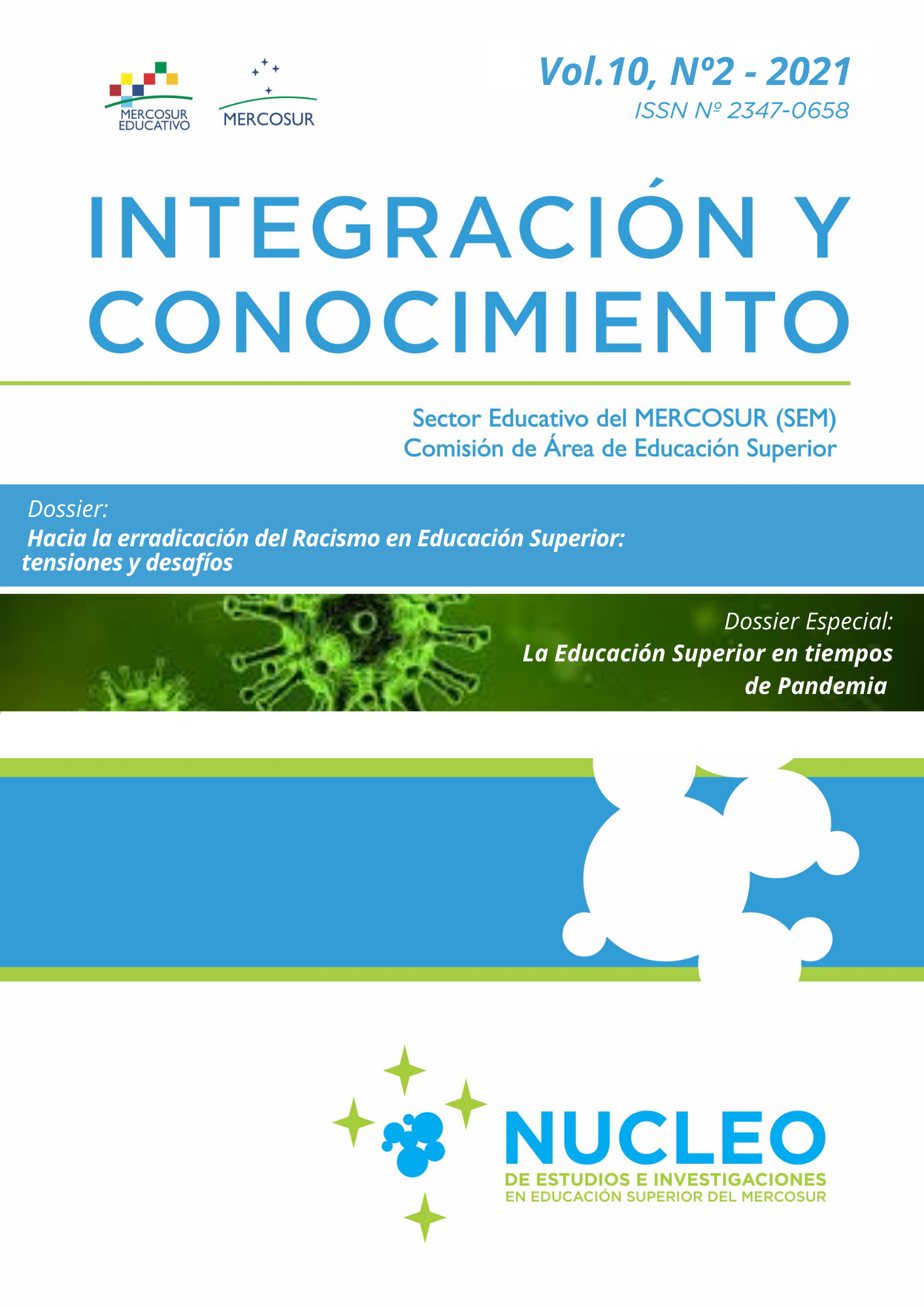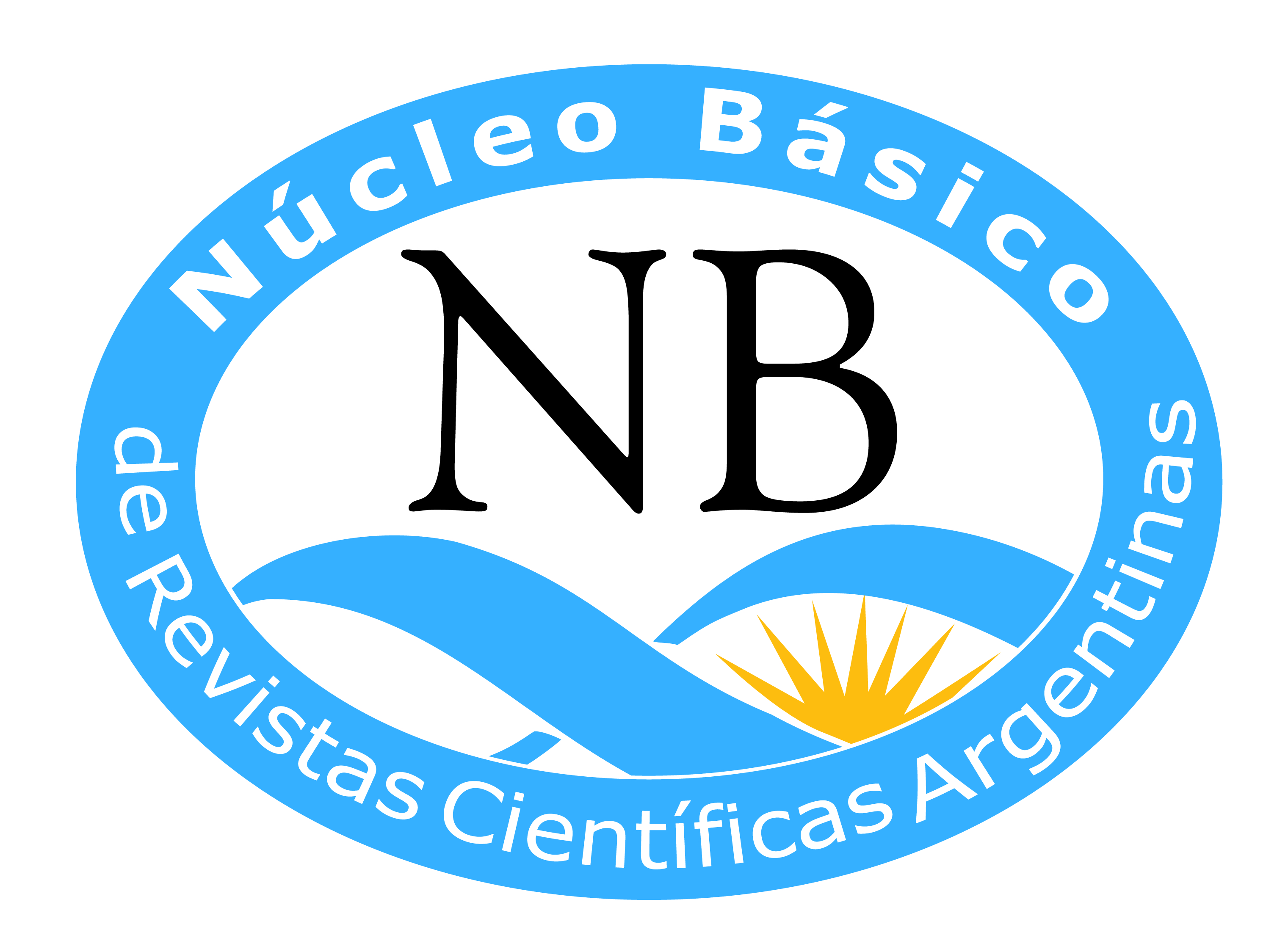The argentine university before and after the pandemic: actions against Covid-19 and the challenges of a (possible) reform
DOI:
https://doi.org/10.61203/2347-0658.v10.n2.32404Keywords:
Argentina, UNIVERSITY, COVID-19, TRAINING, RESEARCH, RELATIONSHIP, INTERNATIONALIZATION, REFORM, UNIVERSITY POLICYAbstract
This paper analyzes the responses of Argentine universities to the crisis caused by the Covid-19 pandemic in its three areas of intervention or functions: training, community outreach and internationalization. Actions aimed at responding to the epidemiological situation are presented and considerations are established considering them as part of a broader reflection on the systemic trends of higher education in this country. Likewise, this analysis allows a dialogue with the also current scenario of discussion for a reform of the higher education law. The question underlying the work is: What type/s of university/s will emerge and/or consolidate in the "new normal" of our Latin American societies? In the article, we argue that it is still premature to outline an answer, but if it is feasible to point out, it is that none of the trends that are pointed out is novel. Strictly speaking, what crises generate is the acceleration of pre-existing change processes, although these critical junctures also produce political-institutional innovations that tend to remain past the situation.
Downloads
References
Agamben, G. (2020a). Contagio. Sopa de Wuhan. Pensamiento Contemporáneo en tiempos de pandemias, 1, 31-34.
Agamben, G. (2020b). La invención de una epidemia. Sopa de Wuhan. Pensamiento Contemporáneo en tiempos de pandemias, 1, 17-19.
Byung-Chul, H. (2020). La emergencia viral y el mundo de mañana. Sopa de Wuhan. Pensamiento Contemporaneo en tiempos de pandemias, 1, 97-112.
Capano, G., y Pritoni, A. (2019). Varieties of hybrid systemic governance in European Higher Education. Higher Education Quarterly, 73(1), 10-28.
Clark, B. R. (1987). Los sistemas de Educación Superior. Una mirada comparada sobre la organización académica. México DF: Universidad Metropolitana-Nueva Imagen.
Chiroleu, A. (2018a). Democratización e inclusión en la universidad argentina: sus alcances durante los gobiernos Kirchner (2003-2015). Educacao em Revista, 34, 1-26.
Chiroleu, A. (2018b). Democratización y masificación universitaria: una mirada sobre desigualdades y políticas públicas en el centenario de la Reforma de 1918. Integración y Conocimiento, 1(8), 69-86.
Chiroleu, A., y Iazzeta, O. (2005). La Reforma de la Educación Superior como capítulo de la Reforma del Estado. Peculiaridades y trazos comunes. En E. Rinesi, G. Soprano y C. Suasnábar (Eds.), Universidad, reformas y desafíos. Dilemas de la educación superior en Argentina y en Brasil. Buenos Aires: Prometeo/Universidad General Sarmiento.
Chiroleu, A., y Marquina, M. (2017). Democratisation or credentialism? Public policies of expansion of higher education in Latin America. Policy Reviews in Higher Education, 1(2), 139-160.
Chiroleu, A., Suasnábar, C., y Rovelli, L. I. (2012). Política universitaria en la Argentina: revisando viejos legados en busca de nuevos horizontes. Los Polvorines: Universidad Nacional de General Sarmiento - IEC - CONADU.
Dudda, R. (2020). La Gran Reclusión y el futuro del capitalismo. Nueva Sociedad (287).
Fullan, M., y Escudero, J. M. (2002). Los nuevos significados del cambio en la educación. Barcelona: Octaedro.
García Delgado, D., y Nosetto, L. (2006). El desarrollo en un contexto posneoliberal: hacia una sociedad para todos. Buenos Aires: Ciccus.
Harari, Y. N. (2020). The world after coronavirus. Financial Times, (20), 1-11.
IEC-CONADU. (2019). Financiamiento para las Universidades Nacionales en el gobierno de Cambiemos (2016-Primer semestre 2019) - 15 puntos básicos. Informes. Buenos Aires: IEC- CONADU
IESALC-UNESCO. (2020). COVID-19 y Educación Superior: de los efectos inmediatos al día después. Análisis de impactos, respuestas políticas y recomendaciones. Caracas: IESALC-UNESCO.
Kingdon, J. W. (1995). Agendas, alternatives, and public policies. New York: HaperCollins College Publisher.
Ley 26.075 de Financiamiento Educativo. Recuperado de http://servicios.abc.gov.ar/lainstitucion/revistacomponents/revista/archivos/anales/numero07/archivosparaimprimir/7_financiamiento_st.pdf
Ley de Educación Nacional Nº 26.206. Recuperado de https://www.argentina.gob.ar/educacion/valideztitulos/glosario/ley26206#:~:text=La%20Ley%20de%20Educaci%C3%B3n%20Nacional,de%20una%20sociedad%20m%C3%A1s%20justa
Lucardi, A. (2018). La educación superior como derecho y el rol de las políticas públicas: un balance sobre la democratización universitaria en la Argentina reciente. En M. Benente (Ed.), La universidad se pinta de pueblo: educación superior, democracia y derechos humanos (pp. 121-144). José C. Paz: Edunpaz.
Lucardi, A. (2020). Las políticas universitarias del nuevo gobierno en Argentina: el desafío de fortalecer la democratización de la Universidad. Universidades (85), 81-95.
Marinoni, G., van’t Land, H., y Jensen, T. (2020). The impact of Covid-19 on higher education around the world: IAU Global Survey Report. Paris: International Association of Universities.
Naidorf, J., y Perrotta, D. (2015). La ciencia social politizada y móvil de una nueva agenda latinoamericana orientada a prioridades. Revista de la educación superior, 44 (174), 19-46.
Pardo Kuklinski, H., y Cobo, C. (2020). Expandir la universidad más allá de la enseñanza remota de emergencia. Ideas hacia un modelo híbrido post-pandemia. Barcelona: Outliers School.
Peters, M. A., y Bulut, E. (2011). Cognitive capitalism, education, and digital labor. New York: Peter Lang.
Peters, M. A., y Reveley, J. (2014). Retrofitting Drucker: Knowledge work under cognitive capitalism. Culture and Organization, 20 (2), 135-151.
Poggi, M. (2011). Innovaciones educativas y escuelas en contextos de pobreza. Evidencias para las políticas de algunas experiencias en América Latina. Buenos Aires: IIPE UNESCO.
Popkewitz, T. (1991). Sociología política de las reformas educativas: el poder-saber en la enseñanza, la formación del profesorado y la investigación. Madrid: Ediciones Morata.
Rinesi, E. (2015). La universidad como derecho de los ciudadanos y del pueblo. En S. Mauro, D. del Valle y F. Montero (Eds.), Universidad pública y desarrollo : innovación, inclusión y democratización del conocimiento (pp. 108-115). Buenos Aires: CLACSO - IEC Conadu.
Sabatier, P. A., y Jenkins-Smith, H. C. (1988). Symposium editors' introduction. Policy Sciences, 21(2), 123-127.
Sader, E. (2009). El nuevo topo. Los caminos de la izquierda Latinoamericana. Buenos Aires: Siglo XXI-Clacso coediciones.
Suasnábar, C. (2005). Entre la inercia y la búsqueda de una nueva agenda de política: Las políticas universitarias en el gobierno de Kirchner. Revista Temas y Debates(10), 83-93.
Suasnabar, C., y Rovelli, L. (2012). Impensar las políticas de educación superior en la Argentina reciente. En A. Chiroleu, M. Marquina y E. Rinesi (Eds.), La política universitaria de los gobiernos Kirchner: continuidades, rupturas, complejidades. Los Polvorines: Universidad Nacional de General Sarmiento - IEC - CONADU.
Svampa, M. (2020). Reflexiones para un mundo post-coronavirus. Revista Nueva Sociedad, (abril).
Unzué, M. (2016). Los universitarios y la política: interacciones entre la representación política y la universidad en los Congresos Nacionales de Argentina y Brasil. Buenos Aires: Imago Mundi.
Downloads
Published
Issue
Section
License

This work is licensed under a Creative Commons Attribution-NonCommercial-ShareAlike 4.0 International License.
Authors who have publications with this journal accept the following terms:
a. Authors shall retain their copyright and guarantee the journal the right of first publication of their work, which shall simultaneously be subject to the Creative Commons License of Recognition which allows third parties to share the work as long as its author is indicated and its first publication is this journal.
b. Authors may adopt other non-exclusive licensing agreements for the distribution of the published version of the work (e.g., depositing it in an institutional telematic archive or publishing it in a monographic volume) provided that the initial publication in this journal is indicated.
c. Authors are allowed and encouraged to disseminate their work via the Internet (e.g. in institutional telematic archives or on their website) after publication of the article, which may lead to interesting exchanges and increased citations of the published work. (See The Effect of Open Access).



